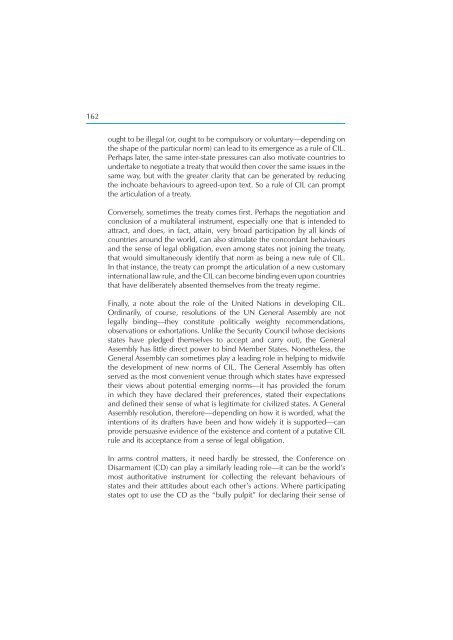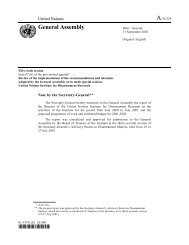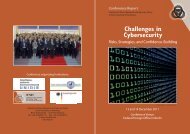Security in Space The Next Generation - UNIDIR
Security in Space The Next Generation - UNIDIR
Security in Space The Next Generation - UNIDIR
Create successful ePaper yourself
Turn your PDF publications into a flip-book with our unique Google optimized e-Paper software.
162<br />
ought to be illegal (or, ought to be compulsory or voluntary—depend<strong>in</strong>g on<br />
the shape of the particular norm) can lead to its emergence as a rule of CIL.<br />
Perhaps later, the same <strong>in</strong>ter-state pressures can also motivate countries to<br />
undertake to negotiate a treaty that would then cover the same issues <strong>in</strong> the<br />
same way, but with the greater clarity that can be generated by reduc<strong>in</strong>g<br />
the <strong>in</strong>choate behaviours to agreed-upon text. So a rule of CIL can prompt<br />
the articulation of a treaty.<br />
Conversely, sometimes the treaty comes fi rst. Perhaps the negotiation and<br />
conclusion of a multilateral <strong>in</strong>strument, especially one that is <strong>in</strong>tended to<br />
attract, and does, <strong>in</strong> fact, atta<strong>in</strong>, very broad participation by all k<strong>in</strong>ds of<br />
countries around the world, can also stimulate the concordant behaviours<br />
and the sense of legal obligation, even among states not jo<strong>in</strong><strong>in</strong>g the treaty,<br />
that would simultaneously identify that norm as be<strong>in</strong>g a new rule of CIL.<br />
In that <strong>in</strong>stance, the treaty can prompt the articulation of a new customary<br />
<strong>in</strong>ternational law rule, and the CIL can become b<strong>in</strong>d<strong>in</strong>g even upon countries<br />
that have deliberately absented themselves from the treaty regime.<br />
F<strong>in</strong>ally, a note about the role of the United Nations <strong>in</strong> develop<strong>in</strong>g CIL.<br />
Ord<strong>in</strong>arily, of course, resolutions of the UN General Assembly are not<br />
legally b<strong>in</strong>d<strong>in</strong>g—they constitute politically weighty recommendations,<br />
observations or exhortations. Unlike the <strong>Security</strong> Council (whose decisions<br />
states have pledged themselves to accept and carry out), the General<br />
Assembly has little direct power to b<strong>in</strong>d Member States. Nonetheless, the<br />
General Assembly can sometimes play a lead<strong>in</strong>g role <strong>in</strong> help<strong>in</strong>g to midwife<br />
the development of new norms of CIL. <strong>The</strong> General Assembly has often<br />
served as the most convenient venue through which states have expressed<br />
their views about potential emerg<strong>in</strong>g norms—it has provided the forum<br />
<strong>in</strong> which they have declared their preferences, stated their expectations<br />
and defi ned their sense of what is legitimate for civilized states. A General<br />
Assembly resolution, therefore—depend<strong>in</strong>g on how it is worded, what the<br />
<strong>in</strong>tentions of its drafters have been and how widely it is supported—can<br />
provide persuasive evidence of the existence and content of a putative CIL<br />
rule and its acceptance from a sense of legal obligation.<br />
In arms control matters, it need hardly be stressed, the Conference on<br />
Disarmament (CD) can play a similarly lead<strong>in</strong>g role—it can be the world’s<br />
most authoritative <strong>in</strong>strument for collect<strong>in</strong>g the relevant behaviours of<br />
states and their attitudes about each other’s actions. Where participat<strong>in</strong>g<br />
states opt to use the CD as the “bully pulpit” for declar<strong>in</strong>g their sense of








